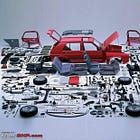FIXING THE STRATA MANAGEMENT MACHINE 04: According to Michael Teys
or, a strata consultant’s approach to the strata management dilemma …
A Quick Read
Almost everyone agrees strata management needs to change, but the harder questions are: What? Why? When? By whom? How?
So, as part of the GoStrata Media series on fixing the strata management machine, here are the views of long-term Australian strata identity and consultant, Michael Teys.
[a 4:75 minute read, with 995 words]
In the article, Does the Strata Management Machine Need Fixing? I used a motoring analogy to ask whether the strata management machine needs fixing, and if so, to discuss what kind of fixes and to outline the issues that may impact those fixes.
Now, there’s a series of articles by interesting strata stakeholders outlining how.
Here’s what long-term Australian strata identity and consultant, Michael Teys, thinks about a brave new strata world.
FROM OLD STRATA TO NEW STRATA: Reimagining Property Ownership for the Future
by Michael Teys
When something’s broken, it's often easier to start again than to fix it.
This is how the next iteration of strata laws will happen. Let's call it NewStrata.
NewStrata will be brought to you by the same banks and developers that brought you OldStrata. Always follow the money. OldStrata came to us because developers wanted to sell thin air, and the banks wanted a piece of the action. But OldStrata has run its course. The buildings can't be repaired. There's no money. They’re falling over. Lives are at risk. The government has to act. The people need to be housed. There's more money to be made in the sky. Again.
In the new strata world, owners corporations will be formed pursuant to a constitution. The constitution will protect the owners’ property rights and govern how the scheme is managed. Schemes will be more bespoke. However, the rules will be simpler than present legislation.
Strata managers will no longer occupy the grey space between agents implementing the decisions of owners, and contractors having delegated decision-making powers and responsibilities they are not confident to use. Strata managers will evolve and become the owners’ representatives.
An owner’s representative will have all the powers necessary to run the owners corporation, but this time these powers will be to the exclusion of the owners corporation. All that will be reserved to the owners will be the power to end the scheme and to remove the owners’ representatives - at any time, without cause, without compensation. In this new order, owners’ representatives will live by the sword and die by the sword.
There will be no committees and no committee meetings. Even at the AGM, no decisions will be made. It will be an information session where the owners’ representative will be held accountable. There will be no buck passing and no excuses. With great power, there always comes great responsibility.
Accordingly, the barriers to entry to be an owners’s representative will be high.
Owners representatives will require:
licenses that will be hard to get,
minimum net worth levels that must be maintained at all times,
cash reserves for working capital sufficient for a rolling 12-month period,
professional indemnity insurance to cover fraud, theft, negligence and catastrophic failure that might come of inaction and malfeasance,
tertiary education for the responsible officers,
compliance plans setting out how they will fulfil their duties, and
independent compliance committees to review their operations quarterly.
They will be regulated nationally. NewStrata has solved the country's housing supply and affordability crises of the 2020s. The states have surrendered. Strata is now of national importance and sits within the federal Ministry of Housing.
Owners will pay for more and do less. Levies will stay. And they will increase, as will the quality of strata life, the built environment, and nature too.
Commissions, kickbacks, conflicts of interest, related party transactions, management rights, and embedded networks have long been gone, outlawed for the common good. It's hard to imagine they were ever allowed.
The best owners’ representatives will be sought after by developers wanting to assure the purchasing public of the highest standards and probity in the formation of the owners corporation. Owners’ representative will be feted by developers but not paid by them, and there will be no favours given to them. If we learnt anything from OldStrata it's that people behave the way they are paid. Owners’ representatives will stand for the owners and be paid by the owners. Always. Forever.
The owners’ first bill will come at settlement, to pay for the set up. Nothing gets attention like a bill. There will never be a better time to set the rules about who’s responsible for these new beginnings. This let us down last time. You own it. You fix it. You pay. Now. This is not a benevolent society. There are no guarantees.
The upside is that at settlement, there will now be a full set of books and records delivered with a digital imprint of the building and all its bits. Capital works management plans will be signed off. The records will be held by the government, filed centrally and always available. We will always know what's been built, by whom, and how. Good developers will be celebrated. The bad will be derided. David Chandler got that right.
The standards of housing and its management in this new world order will be so high that institutional investors will happily enter the residential market. They will comfortably hold the interests they have bought for rent, alongside private owners and investors exercising the same rights and privileges. The cultural divide of institutional owners for commercial property and private investors for residential property will be a thing of the past. There will be plenty of housing for all, and some of it, even, affordable.
Now, you may say I'm a dreamer but ...
(Sorry John)
Michael Teys
June 4, 2025







Interesting- like council elections! Could work well. Democratic and transparent. Reps would be responsive and responsible - members of a respected profession with associated standards of education and skills.